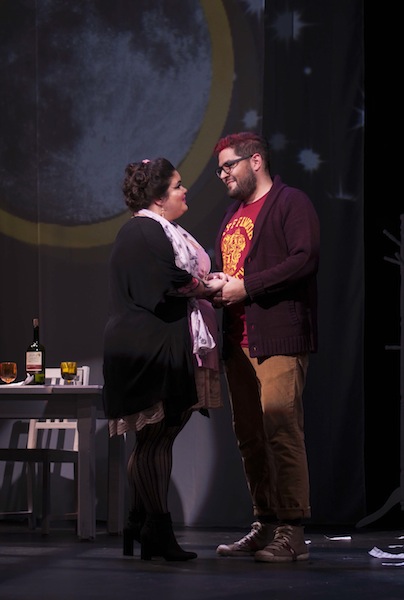Young singers bring enthusiasm to Miami Music Festival’s “Bohème”

Betsy Diaz and Andrés Peñalver starred in Puccini’s “La Bohème” at the Miami Music Festival Thursday night. Photo: Kristin Pulido
Puccini’s La Bohème is an operatic perennial. Based on Henri Murger’s tale of tragic love and poverty among the Bohemian enclave of 19th century Paris, Puccini’s inspired melodies and compelling melodrama have been a magnet for young singers for more than a century.
On Thursday night the youthful cast of the Miami Music Festival’s production brought enthusiasm and dramatic aplomb to director Jennifer Williams’ inventive staging at Barry University in Miami Shores.
With dozens of students in the festival’s vocal program, artistic director Michael Rossi has a vast array of young voices to display in the summer opera productions, most of which are double cast. While this presentation of Puccini’s masterpiece was definitely a student effort, the fresh voices and theatrical instincts of the cast proved winning.
Betsy Diaz hardly looks physically apt for the role of the consumptive Mimi. Yet she possesses a big, luxuriant soprano voice that can take wing in Puccini’s melodic flights and she knows how to command the stage. In the Cafe Momus scene, her voice easily soared over the ensemble. She imbued Mimi’s Act III narrative with a deep sense of despair and captured the poignant underpinnings of her “Addio” and death scene to striking effect. Diaz is one of Miami’s most promising singers.
Anthony Potts exuded pop-star charisma as the painter Marcello. He is clearly a born thespian, bringing dramatic flair to his Act III scene with Diaz and letting the sparks fly in encounters with the Musetta of Jordan Stadvec. His light baritone voice had ring and he brought supple declamation to the text. With his secure vocalism and theatricality, Potts has the makings of a significant career.
Stadvec was a spitfire of a Musetta and a natural scene stealer. She sounded like a coloratura soubrette in the making with crystal-clear high notes capping an attractive bright timbre. Stadvec sang the famous waltz center stage in front of an old-fashioned broadcast microphone, clearly giving a performance.
As a hipster Rodolfo, Andrés Peñalver showed a lighter sound than most tenors in this role but he utilized his resources adroitly, carrying Puccini’s lyric lines to compelling effect. Except for failing to sustain the final note, his “Che gelida manina” was passionate and his voice blended beautifully with Diaz. Rodolfo’s final anguish at Mimi’s death rang true in Peñalver’s portrayal.
Jose Cuartas’ dark baritone resounded as the musician Schaunard. While Cory McGee’s voice is more bass-baritone than basso profundo, he brought a warm timbre and clear intonation to Colline’s coat aria. Ismael Gonzalez was a crotchety Benoit and Alcindoro.
The orchestral forces overwhelmed the Broad Auditorium’s small pit. Double basses were placed to the left and percussion to the right of the pit and the harp was on stage. Rossi managed to balance the scattered forces astutely most of the time, leading a taut performance with plenty of urgency. After some initial rough passages, the student ensemble played with fine sheen, particularly the strong and precise string section.
The excellent Doral Conservatory Children’s Chorus made the most of the kids’ interjections in the Christmas Eve scene and the members of the festival’s opera studio and institute were vociferous in the march that concludes Act II.
Williams’ imaginative production made an asset of the low-budget, bare bones sets. The Bohemians’ horseplay exuded a real sense of fun. Mimi’s death was given grandly tragic dimension on the darkened stage. Yee Eum Nam’s projection of the city of lights was a fine backdrop for the cafe and the barren tree against projections of snow proved a striking visual for the Mimi-Marcello scene. Camilla Haith’s costumes struck a balance between period and contemporary styles.
The Miami Music Festival repeats La Bohème (with an alternate cast) 7:30 p.m. Saturday at Barry University in Miami Shores.
A double bill of Ravel’s L’enfant et les Sortileges and Puccini’s Gianni Schicchi will be presented 7:30 p.m. Friday and 2 p.m. Sunday. miamimusicfestival.com
Posted in Performances
Leave a Comment
Fri Jul 1, 2016
at 12:43 pm
No Comments




